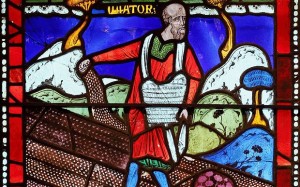Thoughts on Today’s Lessons for Sunday, July 13, 2014
First Reading: Genesis 25:19-34From now through the end of Pentecost, our First Readings will take us through the Bible’s story of God’s chosen people, from Abraham to Isaac, Esau and Jacob, Joseph, Moses and Joshua. Today’s reading offers two themes: First, God acts to continue the ancestral line, even though Isaac and Rebekah, like Isaac’s parents Abraham and Sarah, thought they were unable to have children. Then, Jacob’s tricks reveal once more that God does not choose unbelievably perfect people, but works through flawed and sinful humans, not unlike us.
First Reading (Track Two): Isaiah 55:10-13
In this reading we hear the concluding verses of the second Isaiah, one of three ancient prophets who theologians believe wrote of the people’s exile to Babylon and eventual return home to Jerusalem, where they would build a restored temple. Having assured the people that God has forgiven their failures of justice, Isaiah now paints a beautiful image of God as the giver of life and sustenance and all that is good. His image of seeds and the sower and Earth’s bounty sets the stage for Jesus’ parable of the Sower that we hear in today’s Gospel.
Psalm: Psalm 119:105-112
One might expect the longest Psalm in the Bible either to celebrate God’s love for us, or to offer joyous thanksgiving for the gifts of life, or to express awe at God’s power to move the world. Psalm 119, however, is quite different. Perhaps originally a temple hymn, this psalm offers praise and thanksgiving for God’s laws. Following God’s decrees brings joy, the psalmist sings, promising to obey them faithfully.
Psalm (Track Two): Psalm 65: (1-8), 9-14
Today’s Psalm doubles down on Isaiah’s celebration of God the bountiful creator. Perhaps originally sung as a hymn of thanksgiving for the harvest, it rings the praises of God’s bounty for its overflowing richness, and perhaps just as important, for the joy it provides to those who receive it. Surely this seed has been sown on rich, loamy soil and yielded a hundredfold.
Second Reading: Romans 8:1-11
Paul, a proud Pharisee who counted himself as righteous and blameless under the law, the teaching of Torah that the Psalmist celebrated, now tells the Romans that Christ’s resurrection has freed us from the law of sin and death. If we follow the ways of the world, we are subject to sin and death; but when we accept God’s Spirit through Jesus, we gain life and peace. Our mortal bodies gain life because the Spirit dwells in us.
Gospel: Matthew 13:1-9, 18-23
From today through the rest of Pentecost, our Sunday Gospels will take us through Matthew’s account of Jesus’ teaching through parables. We begin with the parable of the sower, the first told in Matthew and the only parable that Jesus explains. It is tempting to look for specific instruction in the fates of the seeds that fall on the beaten path, on rocks, among thorns, and on fertile ground. Perhaps the message is this simple: Sow God’s word extravagantly, everywhere, and rejoice when it falls on good soil and the harvest is rich. Or perhaps we are told to decide what kind of soil we will be when we hear God’s word. Parables don’t come straight at us. They make us think.

